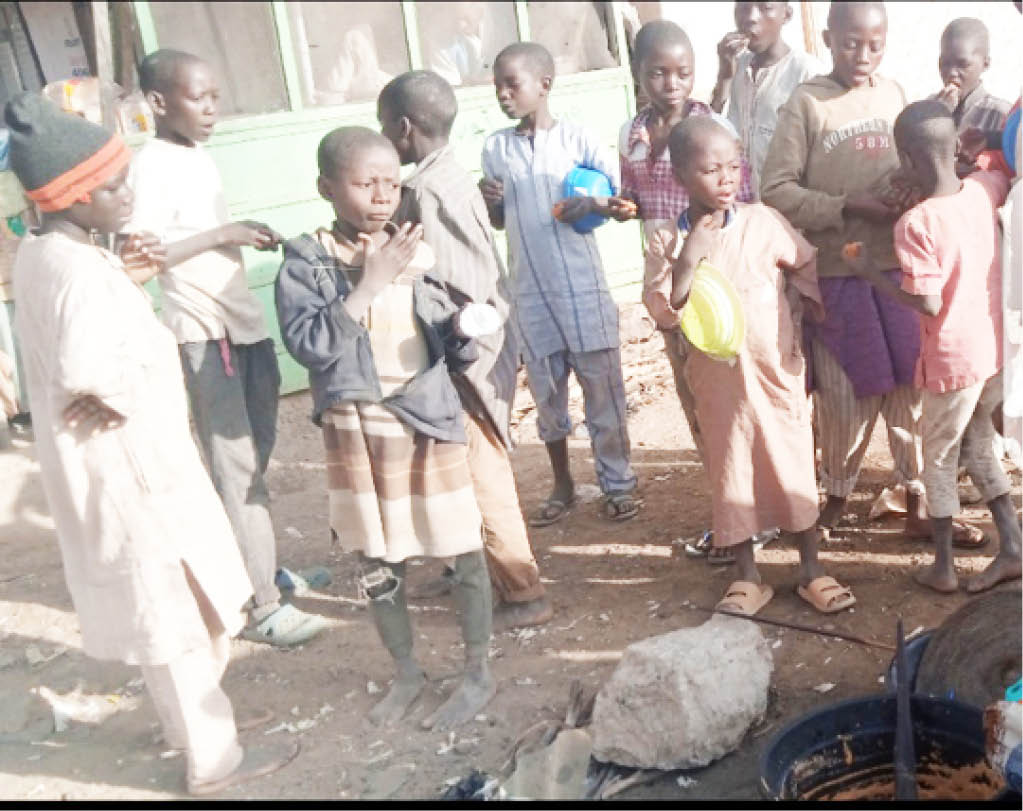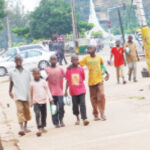From my mailbox
Good afternoon, Mr Suleiman. Thanks for your piece “Almajirai are out-of-school children” (THE WHITE PAPER, Daily Trust, 20/01/25). It baffles me that the almajiri system is allowed to exist in today’s world. It baffles me that a parent is comfortable shipping his very young children to a totally different location or environment, and the young vulnerable children are left to fend for themselves, through begging. With the time the children spend on the streets begging, to have something to eat. I often wonder how they can ever learn anything. And it baffles me that the North does not seem to realise the grave urgency of taking all children off the streets and ensuring that, at the minimum, compulsorily, they go through primary schools. I strongly suggest that failure of parents or guardians to directly provide for their wards should be criminalised.
Engr. Ismail Saliu
0706 345 9049
Sir, one prominent northern Islamic scholar once said the elites do not like the almajiri because they prefer to feed their dogs with leftover meals. The question nobody asked the mallam was why any free born child should be fed leftover meals.
- Shahada, Zaria
0803 964 8782
SAS. Right from day one, I knew the position expressed by the Minister of Stete for Education Dr Suwaiba Sa’id (from my native Jigawa State), that almajirai are “not out-of-school children” will be challenged. Therefore, your last Monday column entitled, ALMAJIRAI ARE OUT-OF-SCHOOL CHILDREN, was not a surprise. But the question is, if they are not out of school, they are certainly not in any formally recognised institution or system with any grading or certification arrangement. It is like when we discuss official statistics; several aspects of our national life are not captured there and therefore are technically out. During the Jonathan administration (with coincidentally another lady from my native Jigawa State, a senior education minister), they began experimenting with “Tsangaya schools” (since somewhat abandoned), with even boarding facilities. But what percentage of the Almajirci, Qur’anic or Tsangaya pupils will be captured under such an arrangement to merit being IN, rather than out of schools. With apologies to the Federal Ministry of Education, UNESCO, UNICEF and other national academic certification organisations, the issue of who qualifies as being out or into schools as it relates to Tsangaya method of learning, needs further in-depth study, appreciation and funding mechanism to address. The way the current almajiri and other out-of-school commissions are run like any other grammar-blowing institution of the government based in Abuja, will only pay lip service to the subject matter. We need to come down to communities and neighbourhoods and watch these Tsangaya systems in operation and get the relevant stakeholders to arrive at a practical and sustainable solution. For all practical sense and purpose therefore, almajirai (itinerant Quranic students) are there ‘learning’ (itself debatable?) whether we call them in or out of schools in a ‘formal’ sense. The debate over what constitutes almajiri being in or out of schools therefore must be scaled up as neither the view expressed by the junior education minister Suwaiba, nor those in your article under review can conclusively close the chapter on almajirci. But your view on “first abolishing before transforming” the Tsangaya system, is easier said than done. This is because despite its several contradictions, there are well placed and influential traditional Quranic scholars who seem to defend it as a matter of “do-or-die affair”. Governments at various levels and other relevant stakeholders particularly in the northern states, must, therefore, as a matter of urgency, convene a high-level all-inclusive dialogue to address the issue of almajiri system of education. During the Gov Shekarau administration in Kano State (2003-2011), they went to Sudan to study their vibrant Quranic model school system. This and others can be replicated to suit our practical realities for instance. The negative consequences of inaction will be devastating in the long run and render the current manifestations a mere dress rehearsal.
Garba Isa, Jigawa
0802 916 9551
Salam,
Today’s Back page on Almajiri system: Many thanks for highlighting the issues in clear terms.
Dahiru Ibrahim
dahiruibrahim2001@gmail.com
- ‘Lawmakers demand N480m from varsities to approve 2025 budget’
- NIMC, NIBSS to roll out multipurpose biometric ID card
Re: Tinubu’s new coalition: I hope you are not pleading with the president to take correction.
Capt. Sadauki (rtd)
0802 858 7750
By 2027, Tinubu’s achievements will speak louder than promises. Nigeria will see improved security, stable electricity, a revitalised economy, and a robust transportation system. His reforms will deliver real, measurable results, leaving opponents to merely speculate on what they could do better.
If God grants him life and strength, and he chooses to contest in 2027, President Tinubu’s re-election will not just be a possibility—it will be a certainty. His vision, achievements, and widespread support make his victory inevitable.
Smiles.
Prince Adeyemi Shonibare
princeaseperi@gmail.com
Re: Tinubu’s new 2027 coalition
The presidential condolence visit to Bishop Kukah and establishment of a federal university in Kaduna South are strategic moves. Kukah, the arch-opponent of the so-called Muslim-Muslim ticket, is thereby disarmed. Tinubu is no longer a Muslim president but a fighter for justice out to correct the ills that are bedevilling the North – combating Hausa-Fulani domination as the Kukahs see it. In 2027, it’s the Christians who will work the religious angle the more.
I have been puzzled by the Lagos-Calabar coastal highway project since its announcement. First, it was dropped on the country like a nuclear weapon, without any warning and before people digested it, work had already begun. No legislative approval. Until now, there’s no document outlining its route. My take is that the economic justification for the highway is rather thin – a thinly populated area of the country with yet unknown resources to make the project worth the cost. More than that, I would have thought that the existing highway – Lagos-Shagamu-Ore-Benin City-Asaba-Aba all the way to Port Harcourt, would suffice if properly reconstructed. Not to mention the Benin City to Warri highway, a spur leading on to Yenagoa hence to Port Harcourt again. I would like to hear from you on the economics of this project please.
The Tax Reform Bills will task northern politicians to no end. Should they fail to kill them – a sad possibility – then they will have killed themselves and the North. Tinubu will then rule supreme. The most contentious portion of the bills is the proposed change in the VAT distribution formula. Since these are tax bills, northern legislators should insist on it being decoupled from the rest and deliberated on its own.
The next four years will make or break the North and indeed Nigeria.
Concerning the university for Southern Kaduna making it two for the state, we must count Kebbi, Benue and Bauchi states as the other states with more than one federal university. Kebbi with the University of Agriculture at Zuru and federal universities of medical sciences in Azare (Bauchi) and Otukpo (Benue).
Thank you
Mohammed Tukur Usman
aboumahmud@yahoo.com
President Tinubu dishing FG resources to left, right, front, back, and centre is the right thing to do. He is for all after the election: inclusion. Buhari’s administration was highly discriminatory. Tinubu will win the election in 2027 outright.
Danmaigona C.
0803 630 7559

 Join Daily Trust WhatsApp Community For Quick Access To News and Happenings Around You.
Join Daily Trust WhatsApp Community For Quick Access To News and Happenings Around You.

